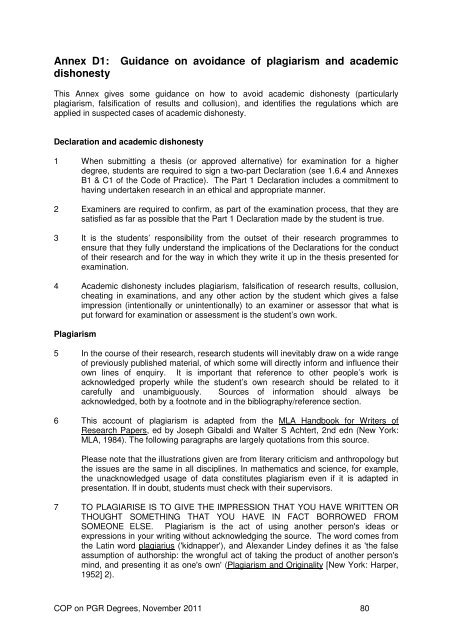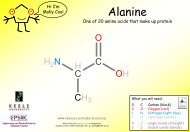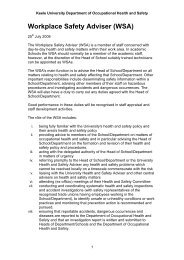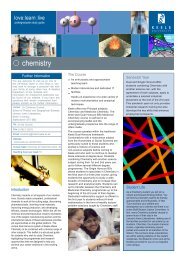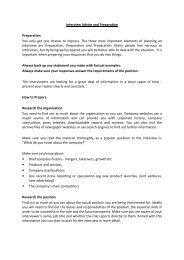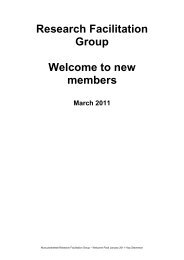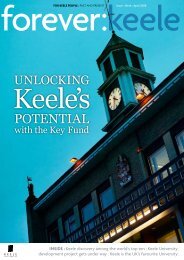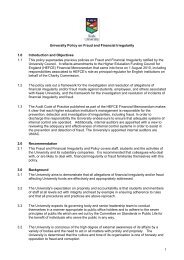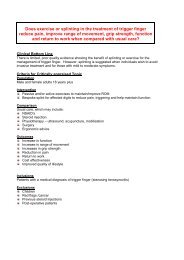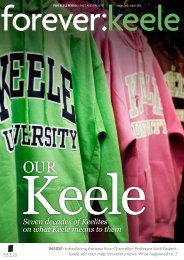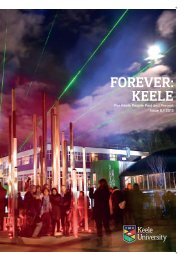keele university code of practice on postgraduate research degrees
keele university code of practice on postgraduate research degrees
keele university code of practice on postgraduate research degrees
You also want an ePaper? Increase the reach of your titles
YUMPU automatically turns print PDFs into web optimized ePapers that Google loves.
Annex D1: Guidance <strong>on</strong> avoidance <str<strong>on</strong>g>of</str<strong>on</strong>g> plagiarism and academic<br />
dish<strong>on</strong>esty<br />
This Annex gives some guidance <strong>on</strong> how to avoid academic dish<strong>on</strong>esty (particularly<br />
plagiarism, falsificati<strong>on</strong> <str<strong>on</strong>g>of</str<strong>on</strong>g> results and collusi<strong>on</strong>), and identifies the regulati<strong>on</strong>s which are<br />
applied in suspected cases <str<strong>on</strong>g>of</str<strong>on</strong>g> academic dish<strong>on</strong>esty.<br />
Declarati<strong>on</strong> and academic dish<strong>on</strong>esty<br />
1 When submitting a thesis (or approved alternative) for examinati<strong>on</strong> for a higher<br />
degree, students are required to sign a two-part Declarati<strong>on</strong> (see 1.6.4 and Annexes<br />
B1 & C1 <str<strong>on</strong>g>of</str<strong>on</strong>g> the Code <str<strong>on</strong>g>of</str<strong>on</strong>g> Practice). The Part 1 Declarati<strong>on</strong> includes a commitment to<br />
having undertaken <strong>research</strong> in an ethical and appropriate manner.<br />
2 Examiners are required to c<strong>on</strong>firm, as part <str<strong>on</strong>g>of</str<strong>on</strong>g> the examinati<strong>on</strong> process, that they are<br />
satisfied as far as possible that the Part 1 Declarati<strong>on</strong> made by the student is true.<br />
3 It is the students’ resp<strong>on</strong>sibility from the outset <str<strong>on</strong>g>of</str<strong>on</strong>g> their <strong>research</strong> programmes to<br />
ensure that they fully understand the implicati<strong>on</strong>s <str<strong>on</strong>g>of</str<strong>on</strong>g> the Declarati<strong>on</strong>s for the c<strong>on</strong>duct<br />
<str<strong>on</strong>g>of</str<strong>on</strong>g> their <strong>research</strong> and for the way in which they write it up in the thesis presented for<br />
examinati<strong>on</strong>.<br />
4 Academic dish<strong>on</strong>esty includes plagiarism, falsificati<strong>on</strong> <str<strong>on</strong>g>of</str<strong>on</strong>g> <strong>research</strong> results, collusi<strong>on</strong>,<br />
cheating in examinati<strong>on</strong>s, and any other acti<strong>on</strong> by the student which gives a false<br />
impressi<strong>on</strong> (intenti<strong>on</strong>ally or unintenti<strong>on</strong>ally) to an examiner or assessor that what is<br />
put forward for examinati<strong>on</strong> or assessment is the student’s own work.<br />
Plagiarism<br />
5 In the course <str<strong>on</strong>g>of</str<strong>on</strong>g> their <strong>research</strong>, <strong>research</strong> students will inevitably draw <strong>on</strong> a wide range<br />
<str<strong>on</strong>g>of</str<strong>on</strong>g> previously published material, <str<strong>on</strong>g>of</str<strong>on</strong>g> which some will directly inform and influence their<br />
own lines <str<strong>on</strong>g>of</str<strong>on</strong>g> enquiry. It is important that reference to other people’s work is<br />
acknowledged properly while the student’s own <strong>research</strong> should be related to it<br />
carefully and unambiguously. Sources <str<strong>on</strong>g>of</str<strong>on</strong>g> informati<strong>on</strong> should always be<br />
acknowledged, both by a footnote and in the bibliography/reference secti<strong>on</strong>.<br />
6 This account <str<strong>on</strong>g>of</str<strong>on</strong>g> plagiarism is adapted from the MLA Handbook for Writers <str<strong>on</strong>g>of</str<strong>on</strong>g><br />
Research Papers, ed by Joseph Gibaldi and Walter S Achtert, 2nd edn (New York:<br />
MLA, 1984). The following paragraphs are largely quotati<strong>on</strong>s from this source.<br />
Please note that the illustrati<strong>on</strong>s given are from literary criticism and anthropology but<br />
the issues are the same in all disciplines. In mathematics and science, for example,<br />
the unacknowledged usage <str<strong>on</strong>g>of</str<strong>on</strong>g> data c<strong>on</strong>stitutes plagiarism even if it is adapted in<br />
presentati<strong>on</strong>. If in doubt, students must check with their supervisors.<br />
7 TO PLAGIARISE IS TO GIVE THE IMPRESSION THAT YOU HAVE WRITTEN OR<br />
THOUGHT SOMETHING THAT YOU HAVE IN FACT BORROWED FROM<br />
SOMEONE ELSE. Plagiarism is the act <str<strong>on</strong>g>of</str<strong>on</strong>g> using another pers<strong>on</strong>'s ideas or<br />
expressi<strong>on</strong>s in your writing without acknowledging the source. The word comes from<br />
the Latin word plagiarius ('kidnapper'), and Alexander Lindey defines it as 'the false<br />
assumpti<strong>on</strong> <str<strong>on</strong>g>of</str<strong>on</strong>g> authorship: the wr<strong>on</strong>gful act <str<strong>on</strong>g>of</str<strong>on</strong>g> taking the product <str<strong>on</strong>g>of</str<strong>on</strong>g> another pers<strong>on</strong>'s<br />
mind, and presenting it as <strong>on</strong>e's own' (Plagiarism and Originality [New York: Harper,<br />
1952] 2).<br />
COP <strong>on</strong> PGR Degrees, November 2011 80


